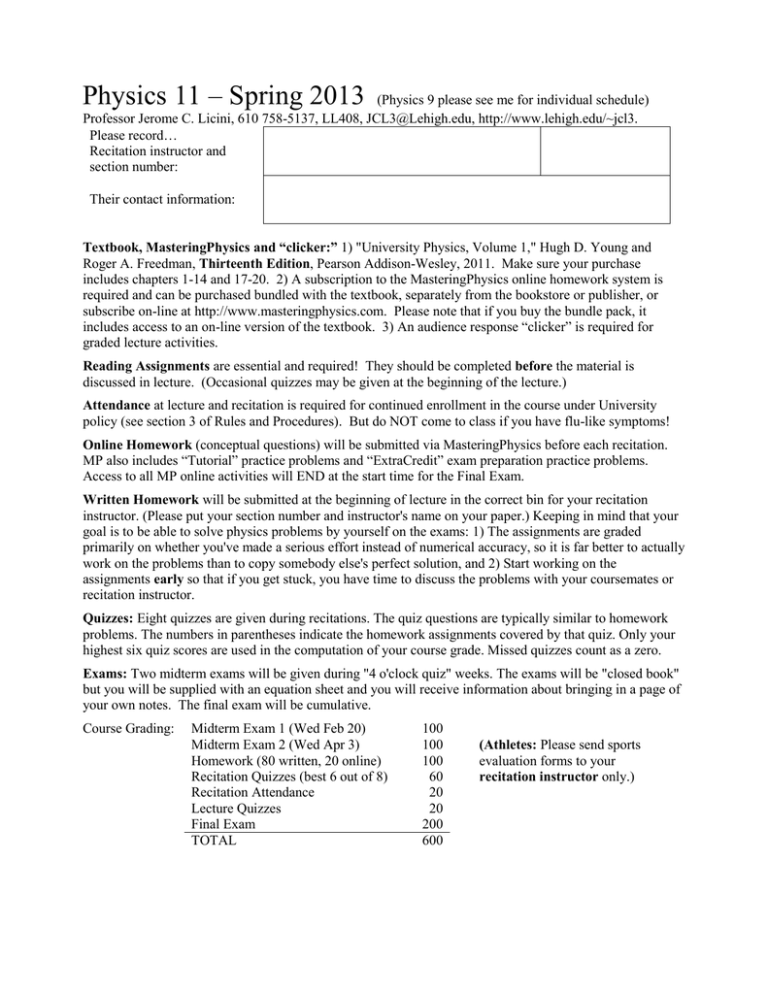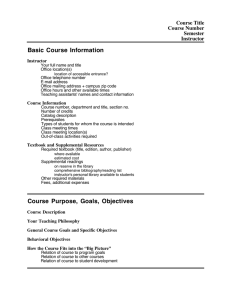
Physics 11 – Spring 2013
(Physics 9 please see me for individual schedule)
Professor Jerome C. Licini, 610 758-5137, LL408, JCL3@Lehigh.edu, http://www.lehigh.edu/~jcl3.
Please record…
Recitation instructor and
section number:
Their contact information:
Textbook, MasteringPhysics and “clicker:” 1) "University Physics, Volume 1," Hugh D. Young and
Roger A. Freedman, Thirteenth Edition, Pearson Addison-Wesley, 2011. Make sure your purchase
includes chapters 1-14 and 17-20. 2) A subscription to the MasteringPhysics online homework system is
required and can be purchased bundled with the textbook, separately from the bookstore or publisher, or
subscribe on-line at http://www.masteringphysics.com. Please note that if you buy the bundle pack, it
includes access to an on-line version of the textbook. 3) An audience response “clicker” is required for
graded lecture activities.
Reading Assignments are essential and required! They should be completed before the material is
discussed in lecture. (Occasional quizzes may be given at the beginning of the lecture.)
Attendance at lecture and recitation is required for continued enrollment in the course under University
policy (see section 3 of Rules and Procedures). But do NOT come to class if you have flu-like symptoms!
Online Homework (conceptual questions) will be submitted via MasteringPhysics before each recitation.
MP also includes “Tutorial” practice problems and “ExtraCredit” exam preparation practice problems.
Access to all MP online activities will END at the start time for the Final Exam.
Written Homework will be submitted at the beginning of lecture in the correct bin for your recitation
instructor. (Please put your section number and instructor's name on your paper.) Keeping in mind that your
goal is to be able to solve physics problems by yourself on the exams: 1) The assignments are graded
primarily on whether you've made a serious effort instead of numerical accuracy, so it is far better to actually
work on the problems than to copy somebody else's perfect solution, and 2) Start working on the
assignments early so that if you get stuck, you have time to discuss the problems with your coursemates or
recitation instructor.
Quizzes: Eight quizzes are given during recitations. The quiz questions are typically similar to homework
problems. The numbers in parentheses indicate the homework assignments covered by that quiz. Only your
highest six quiz scores are used in the computation of your course grade. Missed quizzes count as a zero.
Exams: Two midterm exams will be given during "4 o'clock quiz" weeks. The exams will be "closed book"
but you will be supplied with an equation sheet and you will receive information about bringing in a page of
your own notes. The final exam will be cumulative.
Course Grading:
Midterm Exam 1 (Wed Feb 20)
Midterm Exam 2 (Wed Apr 3)
Homework (80 written, 20 online)
Recitation Quizzes (best 6 out of 8)
Recitation Attendance
Lecture Quizzes
Final Exam
TOTAL
100
100
100
60
20
20
200
600
(Athletes: Please send sports
evaluation forms to your
recitation instructor only.)
University Policies: We fully support accommodations for religious or disability reasons. We fully enforce
standards of academic integrity. Please do not hesitate to contact Prof. Licini or your recitation instructor.
RELIGIOUS HOLIDAYS: (Extracted from memo sent by University Provost and Chaplain.)
1. Inform your instructor that you will be absent from class due to observance of religious holidays.
2. Arrange with the instructor to complete assignments or any required make-up work.
3. If you run into difficulties negotiating an acceptable resolution, please call the University Chaplain, Dr.
Lloyd Steffen, at x83877 or e-mail him at lhs1. (Religious holidays are posted on the Chaplain's web page at
http://www.lehigh.edu/~incha/holidays.html)
Accommodations for Students with Disabilities: If you have a disability for which you are or may be
requesting accommodations, please contact both your instructor and the Office of Academic Support
Services, University Center C212 (610-758-4152) as early as possible in the semester. You must have
documentation from the Academic Support Services office before accommodations can be granted.
STATEMENT ON IRRESPONSIBLE ACADEMIC BEHAVIOR: (after Prof. Barry Bean, Biology)
There are many forms of irresponsible behavior that can ruin opportunities for you or for others in this
course; there is no room and no excuse for bad behavior. Examples of irresponsible behavior cover a wide
range, and include cheating, plagiarism, creating hazards or disruptions, slacking on responsibilities, unfairly
exploiting the efforts of others, etc. Appropriate penalties should be expected. Offenders may lose points
from their course totals, and serious offenders may be dropped from the course. Further explanation and
guidelines on academic integrity at Lehigh can be found on the University Student Conduct System web
page (http://www.lehigh.edu/~indost/conduct/hbook_4.html) and on the Fostering Academic Integrity at
Lehigh University web site (http://www.lehigh.edu/academicintegrity).
It is firm policy in this course that cheating or plagiarism are unacceptable violations of academic integrity,
and will earn an F as the semester grade in the course. ALL EXAMS AND QUIZZES ARE REQUIRED TO
BE STRICTLY YOUR OWN INDIVIDUAL WORK!
HOMEWORK COLLABORATION POLICY: (after Prof. Edwin Kay, CSE)
Learning on homework assignments allows for healthy cooperation and collaboration. In grappling with the
course work, the SHARING of ideas is educationally useful. The COPYING of ideas is destructive,
fraudulent, and unacceptable.
It is difficult to know where to draw the line between educationally useful sharing of ideas and the
educationally destructive copying of ideas. I will paraphrase Roger D. Eastman of Loyola College
(attributing the source material!): ``I encourage you to help each other with homework assignments, but I
also want you to understand where the help should stop. Don't take someone else's solution to copy or “for
reference,” or give yours for copying or “for reference.” If you want to show someone your solution to
illustrate the trouble you are having, that's fine; if you want to brainstorm about what the assignment
requires and how to approach it, that's fine; if you want to share your knowledge of physics, that's fine; but
letting someone copy your solution line by line, in fact or spirit, is not fine.'' Working together on
troublesome areas, then continuing individually is a good technique. It is okay to tell the other person what
is wrong and coach them toward solving the problem, but do not simply provide the correct equations.
Please note that the homework grading policy is designed so that making a serious attempt earns most of the
points. In fact, indicating on your homework where you get stuck or have trouble will INCREASE the
chance that you will get some notes of advice from the grader that will actually help you learn how to solve
that type of problem. Submitting a copy of someone else’s perfect solution will lead to LOWER exam
scores since you will be unprepared to work the problems on your own.





